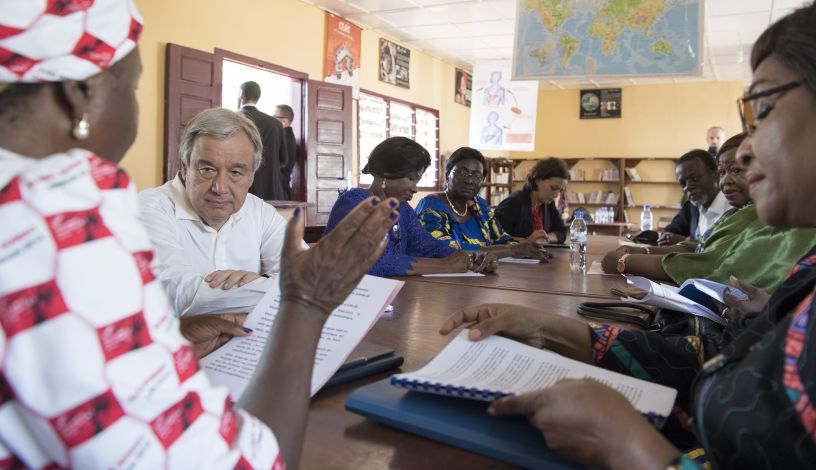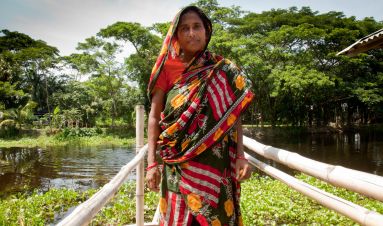Five challenges the UN’s ‘sustaining peace’ agenda needs to address
12 February 2018
As the United Nations Secretary General Antonio Guterres releases his new Peacebuilding and sustaining peace report, Larry Attree argues that the UN must boldly address five big challenges constraining its peace efforts.
In recent years, the United Nations (UN) has engaged in a series of processes to strengthen its ability to perform its core function – to save succeeding generations from the scourge of war.
Beyond the 2030 Agenda for Sustainable Development and its ground-breaking goal on peaceful, just and inclusive societies, the peacebuilding architecture review, the women, peace and security agenda, and the focus on youth and peacebuilding, Secretary General Antonio Guterres’s focus on prevention and the recent birth of the ‘sustaining peace’ agenda have brought about deep reflection on the UN’s role in the modern era.
The list is long – yet we live in a profoundly insecure world where national, rather than human security priorities dominate the global narrative. So can the UN be effective in sustaining peace and prevention today?
Indeed it can – but to get there we need to be honest about the biggest challenges the UN is facing, and think boldly about how to confront them.
UN peace efforts face five big challenges today:
- Geopolitical aggression and intransigence: Conflicts are becoming protracted by intense rivalries between global powers and regional powers as they support proxies to wage war overseas. The wars in Syria and Yemen are prime examples.
- The practice of relabelling conflicts as counter-terror struggles: This tendency leads to the neglect of the factors and actors driving conflict and the erosion of space needed to build peace. We’ve seen this occur in high-profile cases like Syria, but also in Egypt, Turkey and elsewhere. When leaders use the pretext of counter-terror to crush dissent and political opposition, it escalates violent conflict rather than reducing it.
- Legacies of military intervention and regime change: Framed as interventions to counter terror, save civilians or remove rogue regimes, in case after case military intervention and regime change have failed to bring lasting stability or to defeat fundamentalist groups. On the one hand this has brought deep distrust of interventionism – but at the same time there are huge risks in simply giving up on supporting constructive, peaceful change in the face of repression.
- Panic over forced displacement: As desperate people flee conflict zones, the impact of forced displacement is hitting neighbouring countries hardest and they are coping as best they can. Meanwhile, Western governments are making hasty deals to support border and security forces in transit countries to close their borders and shut the problem out. But this train, equip and ignore approach – as in the EU’s Khartoum Process – fails to address the root causes of the problem.
- Struggling humanitarianism: Undoubtedly humanitarians have a tough job. The UN and others are making enormous efforts, with inadequate resources, to assist the victims of conflict. But they are not yet good enough at defending humanitarian values, working for prevention during crisis or empowering those affected by humanitarian crises to take the initiative. And if UN Security Council members – either directly or through allies they support – continue to bomb hospitals or attack humanitarian convoys, we are unlikely to see this change.
How can ‘sustaining peace’ work in the face of these challenges?
In the face of these challenges we need to ask not only ‘what are the right structures and mandates for the UN?’, but also ‘how can we work for conflict resolution and peaceful change in an era of renewed geopolitical division’? Here are six suggestions:
- Apply peacebuilding tools to the geopolitical level of conflict and rivalry. We need new ideas and initiatives on how to mediate conflict, not only in the case of Yemen or Syria but also in terms of fixing the relationships between the parties that stand behind those who are fighting.
- At a time when political consensus for peace is hard to build, it will be critical to use the vision and the mandate of the Sustainable Development Goals (SDGs). This consensus was developed through a uniquely consultative process. Then as now, the concerns that came out around sovereignty were sincere and grounded in real examples. As happened during the process, reassurance should be offered that prevention is actually a recipe for less intervention, not more. SDG16 – and the peaceful, just and inclusive societies agenda as a whole - was not imposed by the global north. It was supported by the African Union, the nations of the Pacific, the g7+ and many others. Civil society organisations unanimously demanded it and so did people in every region of the world. Peace is not a global north conspiracy but in fact something we must now demand of the most powerful nations in our own interest.
- ‘Sustaining peace’ should also be a moment to reclaim the policy space. Policy panic is setting in – framing conflicts as ‘terror’ threats and as a ‘migration’ crisis is exacerbating the problem. Prevention and peacemaking tools are the answer to these problems, and we must safeguard the special mandate of the UN to provide options for mediation and peacemaking rather than gearing it up to fight rebels and terrorists in the name of peace – as it has begun to do in places like Mali and the Congo, with dangerous consequences. Since the UN is taking sides in today’s wars, where will the world look for the mediators and peacemakers it will need in the coming years?
- However scarce political will to sustain peace may be, the UN must not settle for an inert, technocratic approach focused only on building capacity of state institutions. At the heart of the SDGs is a drive for transformative change with more peaceful, just and inclusive societies helping to shape stronger and more inclusive institutions. If sustaining peace merely means reinforcing the very institutions that are at the heart of the problem – such as predatory militaries or corrupt bureaucracies – then we will fail to live up to the ambition of the 2030 Agenda.
- Remaining true to an agenda that will transform people’s lives requires supporting those who work for peaceful change – in and out of government, including women and youth. This requires a willingness to step out of national capitals, to talk to a wider range of people, to build up understanding of conflicts rooted in people’s priorities, and to work in solidarity with people to help them:
- call for peaceful change;
- survive during conflict and maintain cohesion across conflict divides;
- rebuild their lives and their institutions after the guns fall silent;
- get involved fully and meaningfully in peace and reconciliation processes so that they can influence and live with the peace settlements that emerge.
- This is the work Saferworld is doing in places like Somalia, South Sudan and Yemen. This is what peacebuilding organisations around the world will continue to do. But peacebuilding that works with, and through, society for constructive change needs a massive increase in support – perhaps achievable by scaling back the record-level investments being made in fighting war – and looking instead to increasing efforts to support peace.
People around the world want peace and prosperity – they want leaders to champion peacebuilding, to work to prevent conflicts – to build peaceful, just and inclusive societies. At a time when many states are undermining international norms and standards aimed at promoting and protecting peace and human security, we need new champions to ensure the ‘sustaining peace’ agenda achieves tangible, transformative results for all those living in the shadow of violent conflict.
Photo: UN/Eskinder Debebe
Larry Attree is Saferworld’s Head of Global Policy and Advocacy. This article is based on remarks he delivered at the Regional Dialogue on Sustaining Peace in Doha, Qatar, on 19 January 2018.

_cropped.jpg)
